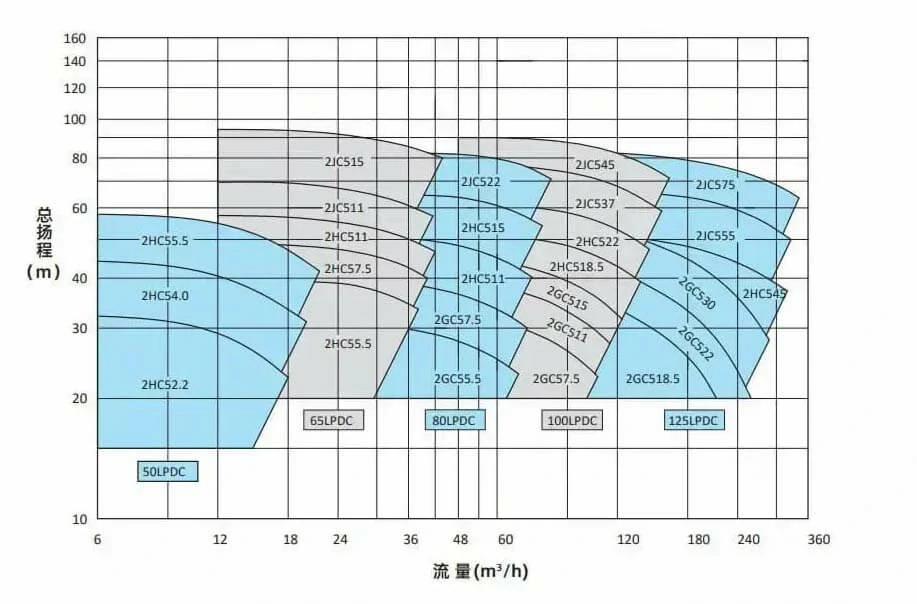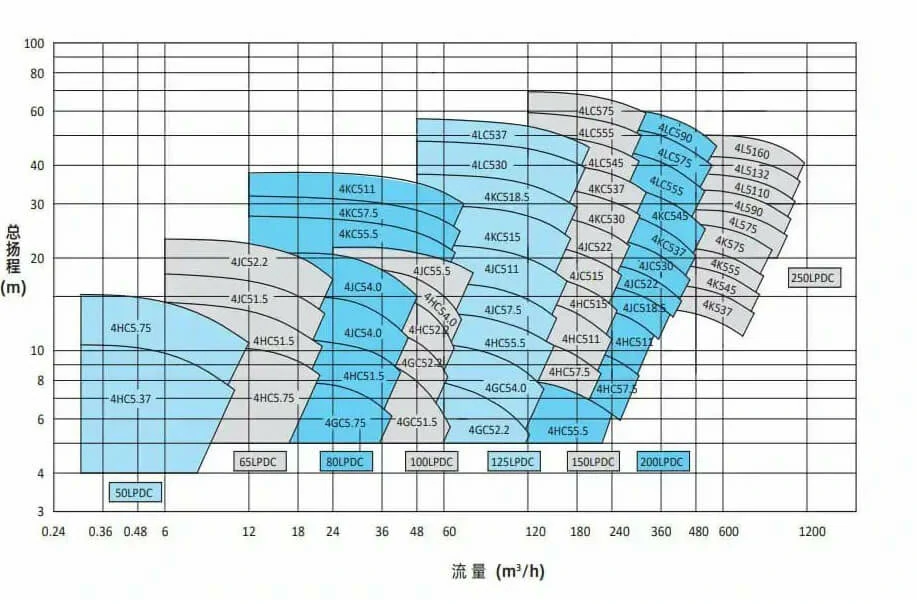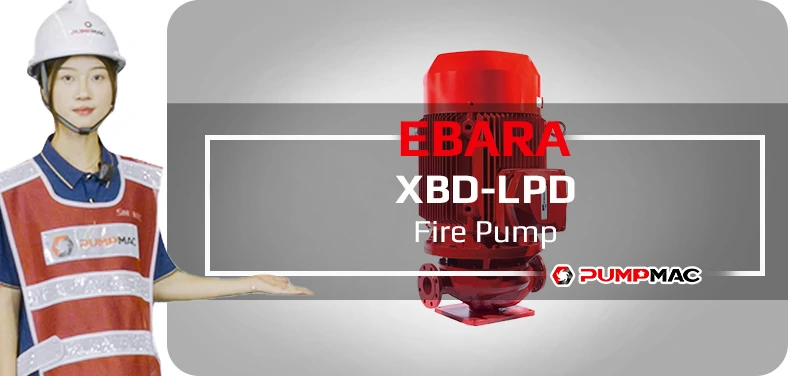XBD-LPD 4JC515 (150LPDC) Fire Pump
EBARA XBD-LPD 4JC515 features a low-noise, TEFC (Totally Enclosed Fan Cooled) motor that can be installed both indoors and outdoors. Impellers and casings developed using our proprietary analytical technology significantly improve performance. 150LPD caliber general-purpose pump. EBARA XBD-LPD 4JC515 pump can be disassembled and inspected without disassembling the pipeline. Its performance and technical conditions comply with the latest national GB6245-2008 “Fire Pump” standard. The product is certified as a fire protection product by the Department of Emergency ManagementThe assessment center passed the appraisal and obtained the fire protection certification.
In the detailed model name, XB indicates the model, 2 indicates the number of motor stages, HC indicates the impeller code, 5 indicates the frequency is 50 Hz, 15 indicates the motor power is 15 kW, 150LPD indicates the inlet and outlet diameters.
As part of EMAC, PumpMac provides abundant premium pump-driven power pack options, WPT PTO, Advance gearbox and pump head, as well as customized water pump set. We also have a set of NFPA20 standard engine power pack accessories including air intake shut-off valve, DC contactor, engine control panel, jacket water heater etc.
We provide full life cycle services for all customers, from design to power system supply, from installation to commissioning, from after-sales service training to spare parts supply, from trouble shooting to overhaul technical support.
Advantages of XBD-LPD 4JC515 (150LPDC) Fire Pump
Small size and light weight.
The pipeline is linear and can be installed in the middle of the pipeline with a small installation volume.
The motor uses a low-noise, fully enclosed, splash-proof outdoor motor. It can be installed indoors or outdoors (all single-phase, except for three-phase 0.15KW).
The pump can be disassembled and repaired without disassembling the pipeline system.
It can be used at high temperature (100°C) and high pressure (suction pressure up to 0.69MPa), so it is most suitable for use as a circulating pump.
It uses a mechanical seal, which is easy to maintain.
Technical Specifications
Water Pump Model | Water Pump Diameter | Motor Poles | Synchronous Speed | Motor Power | Frequency |
| XBD-LPD 4HC5.37 | 50LPDC | 4 | 1500min-1 | 0.4 kW | 50 hz |
| XBD-LPD 4HC5.75 | 50LPDC | 4 | 1500min-1 | 0.75 kW | 50 hz |
| XBD-LPD 4HC5.75 | 65LPDC | 4 | 1500min-1 | 0.75 kW | 50 hz |
| XBD-LPD 4HC51.5 | 65LPDC | 4 | 1500min-1 | 1.5 kW | 50 hz |
| XBD-LPD 4JC51.5 | 65LPDC | 4 | 1500min-1 | 1.5 kW | 50 hz |
| XBD-LPD 4JC52.2 | 65LPDC | 4 | 1500min-1 | 2.2 kW | 50 hz |
| XBD-LPD 4GC5.75 | 80LPDC | 4 | 1500min-1 | 0.75 kW | 50 hz |
| XBD-LPD 4HC51.5 | 80LPDC | 4 | 1500min-1 | 1.5 kW | 50 hz |
| XBD-LPD 4JC54.0 | 80LPDC | 4 | 1500min-1 | 4.0 kW | 50 hz |
| XBD-LPD 4KC55.5 | 80LPDC | 4 | 1500min-1 | 5.5 kW | 50 hz |
| XBD-LPD 4KC57.5 | 80LPDC | 4 | 1500min-1 | 7.5 kW | 50 hz |
| XBD-LPD 4KC511 | 80LPDC | 4 | 1500min-1 | 11 kW | 50 hz |
| XBD-LPD 4GC51.5 | 100LPDC | 4 | 1500min-1 | 1.5 kW | 50 hz |
| XBD-LPD 4GC52.2 | 100LPDC | 4 | 1500min-1 | 2.2 kW | 50 hz |
| XBD-LPD 4HC52.2 | 100LPDC | 4 | 1500min-1 | 2.2 kW | 50 hz |
| XBD-LPD 4HC54.0 | 100LPDC | 4 | 1500min-1 | 4.0 kW | 50 hz |
| XBD-LPD 4JC55.5 | 100LPDC | 4 | 1500min-1 | 5.5 kW | 50 hz |
| XBD-LPD 4GC52.2 | 125LPDC | 4 | 1500min-1 | 2.2 kW | 50 hz |
| XBD-LPD 4GC54.0 | 125LPDC | 4 | 1500min-1 | 4.0 kW | 50 hz |
| XBD-LPD 4HC55.5 | 125LPDC | 4 | 1500min-1 | 5.5 kW | 50 hz |
| XBD-LPD 4JC57.5 | 125LPDC | 4 | 1500min-1 | 7.5 kW | 50 hz |
| XBD-LPD 4JC511 | 125LPDC | 4 | 1500min-1 | 11 kW | 50 hz |
| XBD-LPD 4KC515 | 125LPDC | 4 | 1500min-1 | 15 kW | 50 hz |
| XBD-LPD 4KC518.5 | 125LPDC | 4 | 1500min-1 | 18.5 kW | 50 hz |
| XBD-LPD 4LC530 | 125LPDC | 4 | 1500min-1 | 30 kW | 50 hz |
| XBD-LPD 4LC537 | 125LPDC | 4 | 1500min-1 | 37 kW | 50 hz |
| XBD-LPD 4HC57.5 | 150LPDC | 4 | 1500min-1 | 7.5 kW | 50 hz |
| XBD-LPD 4HC511 | 150LPDC | 4 | 1500min-1 | 11 kW | 50 hz |
| XBD-LPD 4HC515 | 150LPDC | 4 | 1500min-1 | 15 kW | 50 hz |
| XBD-LPD 4JC515 | 150LPDC | 4 | 1500min-1 | 15 kW | 50 hz |
| XBD-LPD 4JC522 | 150LPDC | 4 | 1500min-1 | 22 kW | 50 hz |
| XBD-LPD 4KC530 | 150LPDC | 4 | 1500min-1 | 30 kW | 50 hz |
| XBD-LPD 4KC537 | 150LPDC | 4 | 1500min-1 | 37 kW | 50 hz |
| XBD-LPD 4LC545 | 150LPDC | 4 | 1500min-1 | 45 kW | 50 hz |
| XBD-LPD 4LC555 | 150LPDC | 4 | 1500min-1 | 55 kW | 50 hz |
| XBD-LPD 4LC575 | 150LPDC | 4 | 1500min-1 | 75 kW | 50 hz |
| XBD-LPD 4HC55.5 | 200LPDC | 4 | 1500min-1 | 5.5 kW | 50 hz |
| XBD-LPD 4HC57.5 | 200LPDC | 4 | 1500min-1 | 7.5 kW | 50 hz |
| XBD-LPD 4HC511 | 200LPDC | 4 | 1500min-1 | 11 kW | 50 hz |
| XBD-LPD 4JC518.5 | 200LPDC | 4 | 1500min-1 | 18.5 kW | 50 hz |
| XBD-LPD 4JC522 | 200LPDC | 4 | 1500min-1 | 22 kW | 50 hz |
| XBD-LPD 4JC530 | 200LPDC | 4 | 1500min-1 | 30 kW | 50 hz |
| XBD-LPD 4KC537 | 200LPDC | 4 | 1500min-1 | 37 kW | 50 hz |
| XBD-LPD 4KC545 | 200LPDC | 4 | 1500min-1 | 45 kW | 50 hz |
| XBD-LPD 4LC555 | 200LPDC | 4 | 1500min-1 | 55 kW | 50 hz |
| XBD-LPD 4LC575 | 200LPDC | 4 | 1500min-1 | 75 kW | 50 hz |
| XBD-LPD 4LC590 | 200LPDC | 4 | 1500min-1 | 90 kW | 50 hz |
| XBD-LPD 4K537 | 250LPDC | 4 | 1500min-1 | 37 kW | 50 hz |
| XBD-LPD 4K545 | 250LPDC | 4 | 1500min-1 | 45 kW | 50 hz |
| XBD-LPD 4K555 | 250LPDC | 4 | 1500min-1 | 55 kW | 50 hz |
| XBD-LPD 4K575 | 250LPDC | 4 | 1500min-1 | 75 kW | 50 hz |
| XBD-LPD 4L575 | 250LPDC | 4 | 1500min-1 | 75 kW | 50 hz |
| XBD-LPD 4L590 | 250LPDC | 4 | 1500min-1 | 90 kW | 50 hz |
| XBD-LPD 4L5110 | 250LPDC | 4 | 1500min-1 | 110 kW | 50 hz |
| XBD-LPD 4L5132 | 250LPDC | 4 | 1500min-1 | 132 kW | 50 hz |
| XBD-LPD 4L5160 | 250LPDC | 4 | 1500min-1 | 160 kW | 50 hz |
| ——END—— | |||||


Safety Instructions and Preventive Maintenance Guide
Requirements for use
Pumps play a significant role in a variety of industries and applications, ensuring the smooth movement of liquids and gases. However, in order to maintain top performance and safety, it is essential to adhere to routine maintenance procedures and safety recommendations. This guide aims at providing the detailed information about pump safety and preventive maintenance.
Safety Instructions
1. Read the Manual
Before using EBara pumps, read and understand the handbook thoroughly. Make sure you understand the pump’s specifications, capabilities, and safety precautions.
2. Proper Installation
Ensure the pump is put appropriately according to the guidelines. Improper installation can cause operating inefficiencies and safety issues.
3. Ventilation
Operate pumps in well-ventilated areas to prevent the buildup of potentially harmful gases or vapors. If working in confined spaces, use proper ventilation equipment.
4. Emergency Shutdown Procedures
Familiarize yourself with emergency shutdown procedures in case of malfunction, leakage, or any other hazardous situation. Ensure all personnel know how to operate emergency shutdown mechanisms.
5. Regular Inspections
Conduct routine inspections of the pump and its components for signs of wear, damage, or leaks. Address any issues promptly to prevent accidents or system failures.
6. Chemical Compatibility
If handling hazardous chemicals, ensure the pump materials are compatible with the fluid being pumped or refer our chemical compatibility chart for more information. Incompatible materials can lead to corrosion, leaks, or chemical reactions.
Preventive Maintenance
1. Regular Lubrication
Keep bearings, seals, and other moving parts properly lubricated. Insufficient lubrication can lead to premature wear and breakdowns.
2. Inspect Seals and Gaskets
Check seals and gaskets for wear, damage, or leaks regularly. Replace any worn or damaged seals to prevent fluid leakage and maintain pump efficiency.
3. Check Motor Alignment
Ensure the pump motor is properly aligned with the pump shaft to prevent excessive wear on bearings and seals. Misalignment can lead to premature failure and costly repairs.
4. Replace Worn Parts
Keep an inventory of spare parts and replace worn or damaged components as needed. Regularly check wear parts such as impellers, seals, and bearings for signs of deterioration.
5. Schedule Maintenance
Develop a preventive maintenance schedule based on manufacturer recommendations and operating conditions. Regular maintenance helps prevent unexpected breakdowns and extends the life of the pump.
6. Document Maintenance Records
Keep detailed records of all maintenance activities, including inspections, repairs, and replacements. This information helps track the pump’s performance over time and identify any recurring issues.
By following these safety instructions and preventive maintenance practices, you can ensure the safe operation and longevity of your pumps while minimizing the risk of accidents or downtime. Remember, prioritizing safety and proactive maintenance is key to maximizing pump efficiency and reliability.
Note: All Above Data are Just for Reference, All Data Might Change Without Notices or Updates, Please Contact Our Sales Team to Confirm All Details Via WhatsApp or Email.

Engine Sale Manual

Installation Drawing

Installation Manual

Operation Manual

Parts Catalogue





